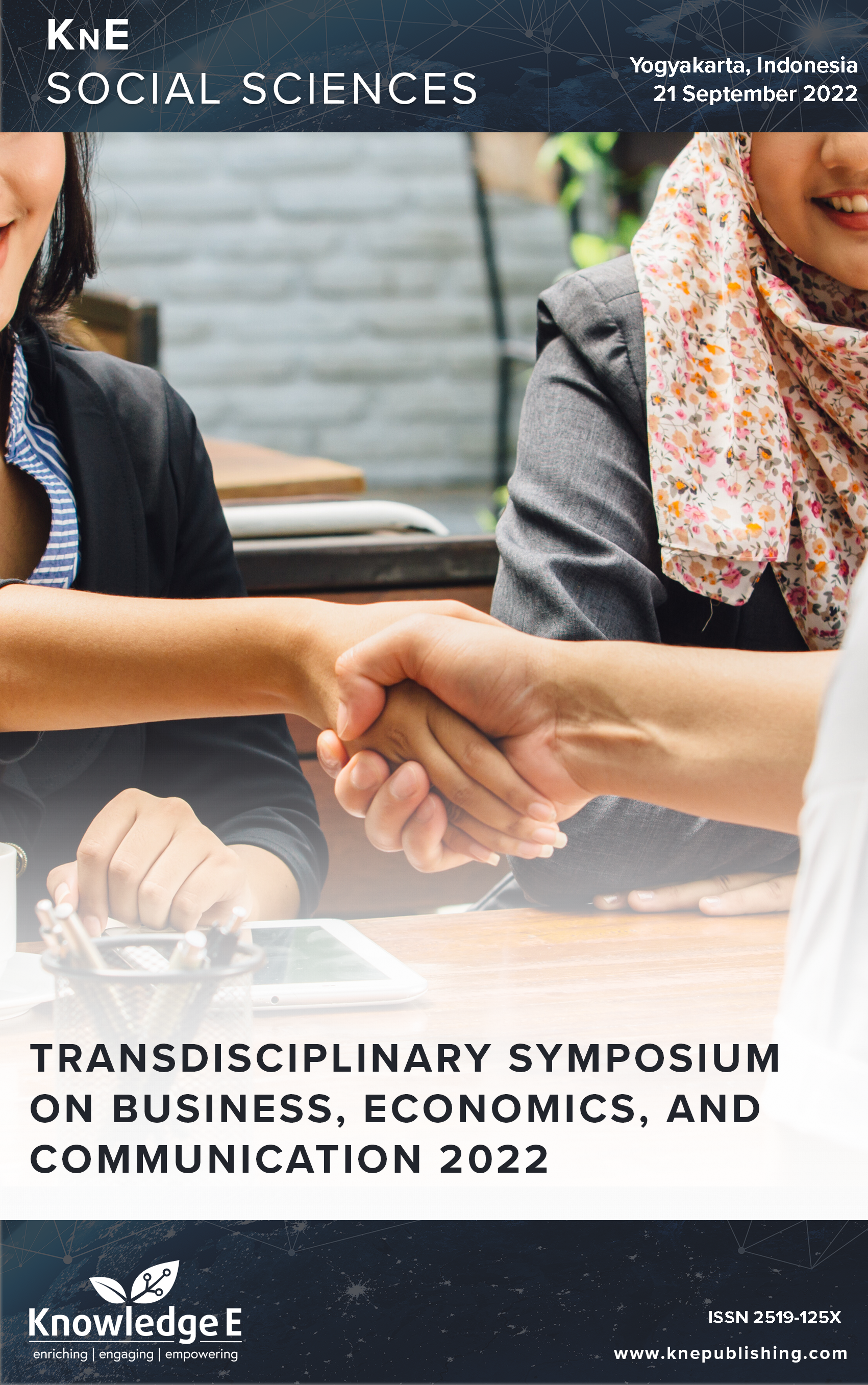Digital Communication Management Government of the Republic of Indonesia for Inclusive and Sustainable Economic Recovery in Indonesia
DOI:
https://doi.org/10.18502/kss.v8i12.13710Abstract
Since 2020, the COVID-19 pandemic has affected not only Indonesia but also other countries in the world. The economic impact of the Covid-19 pandemic has been felt by the Indonesian people since the implementation of the large-scale social restrictions (PSBB) on March 15, 2020. Community activities are forced to be carried out through digital transformation in services, transactions, and work, for example, the Government of the Republic of Indonesia. This research was conducted to determine the digital communication management planning, activities, and evaluation of the Government of the Republic of Indonesia in an inclusive and sustainable economic recovery in Indonesia. The objective of this research is the Government of the Republic of Indonesia. This study uses the method of Phenomenology of Edmund Husserl. Having the concept of phenomenology as a scientific method that does not start with doubt, direction, and the truth of an experience. Data were collected by means of observation, interviews, and documentation. Data analysis techniques in this study use data reduction, data display, and verification of Miles and Huberman. Based on the data findings, data results, and discussions that the researchers have submitted, it can be concluded that the Government of the Republic of Indonesia has implemented Digital Communication Management both from planning, activities, and evaluation in inclusive and sustainable economic recovery through the importance of directed and coordinated digital communication planning through agenda setting and framing are well conceptualized. Digital communication planning of the Government of the Republic of Indonesia through the Ministry of Communication and Information of the Republic of Indonesia, the Ministry of Tourism and Creative Economy of the Republic of Indonesia and the Ministry of Cooperatives of MSMEs of the Republic of Indonesia has been going well with many trainings held so that there are many benefits for the community.
Keywords: management, communication, digital, government, indonesia, economy
References
[2] Sarah ML, Krøtel. Digital Communication of Public Service Information and its Effect on Citizens’ Perception of Received Information. Int J Public Adm. 2019;44(2):132–45.
[3] Aboh SC, Ezeudo OC. Interactions on facebook and twitter: A communicative action perspective. Theory Pract Lang Stud. 2020;10(11):1351–8.
[4] Permatasari AN, Soelistiyowati E, Suastami IGAPP, Johan RA. Digital Public Relations: Trend and Required Skills. J ASPIKOM. 2021;6(2):373–86.
[5] Romero-Hall E, Petersen E, Sindicic R, Li L. Most versus least used social media: undergraduate students’ preferences, participation, lurking, and motivational factors. Int J Soc Media Interact Learn Environ. 2020;6(3):244–66.
[6] Nti IK, Adekoya AF, Opoku M, Nimbe P. Synchronising social media into teaching and learning settings at tertiary education. Int J Soc Media Interact Learn Environ. 2020;6(3):230–43.
[7] Charalambous A. Social media and health policy. Asia-Pacific J Oncol Nurs. 2019;6(1):24–7.
[8] Uitz I. Social Media – Is It Worth The Trouble? J Internet Soc Netw Virtual Communities. 2012;2012:1–14.
[9] Al-Ghafri RK, Al-Badi AH, Al-Ghafri K. Users’ Activities on Social Media as indicators of Self-Esteem: a Case Study in Oman. J Internet Soc Netw Virtual Communities. 2016;2016.
[10] Vaterlaus JM, Patten E V, Spruance LA. #Alonetogether: An Exploratory Study of Social Media Use at the Beginning of the COVID-19 Pandemic. J Soc Media Soc. 2022;11(1):27–45.
[11] Salafia C, Diplacido J. Social Media and Vaping: The Role of Social Norms and Motives. 2022;11(1):3–26.
[12] Sajane S, Gaikwad H. Research on the Impact of Social Media on Business/Startups. Int J Entrep Technopreneur. 2022;2:13–22.
[13] Wilantika N, Wibisono SB. Evaluating the quality of public services through social media. Asian J Public Opin Res. 2021;9(3):240–65.
[14] Akbar GG, Kurniadi D, Nurliawati N. Content Analysis of Social Media: Public and Government Response to COVID-19 Pandemic in Indonesia. J Ilmu Sos dan Ilmu Polit. 2021;25(1):16–31.
[15] Jernigan S. How to change the world: the relationship between social media and social change in the classroom. Int J Soc Media Interact Learn Environ. 2020;6(3):169–80.
[16] Längle S. Star Wars science on social media! Using pop culture to improve STEM skills. Int J Soc Media Interact Learn Environ. 2019;6(2):137–49.
[17] Poespowardojo TS, Seran A. Filsafat Ilmu Pengetahuan Hakikat Ilmu Pengetahuan, Kritik terhadap Visi Positivisme Logis, serta Implikasinya. Jakarta: PT Kompas Media Nusantara; 2015.
[18] Nasrullah R. Manajemen Komunikasi Digital Perencanaan, Aktivitas dan Evaluasi. Jakarta: PrenadaMedia; 2021.
[19] Sugiyono. Metode Penelitian Komunikasi (Kuantitatif, Kualitatif dan Cara Mudah Menulis Artikel pada Jurnal Internasional. Bandung: Alfabeta; 2021.
[20] Miles M, Huberman M. Analisis Data Kualitatif: Buku Sumber Tentang Metode– metode Baru. 1992;747–2829.
[21] Ronda M. Tafsir Kontemporer Ilmu Komunikasi Tinjauan Teoritis Epistemologi Aksiologi. Jakarta: Indigo Media Bekerja Sama dengan Yayasan Kompatibel; 2018.

